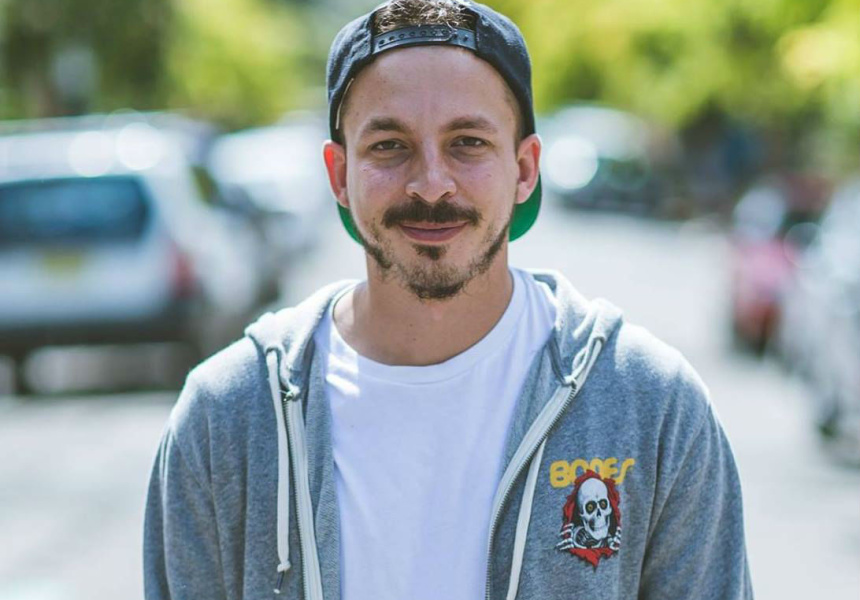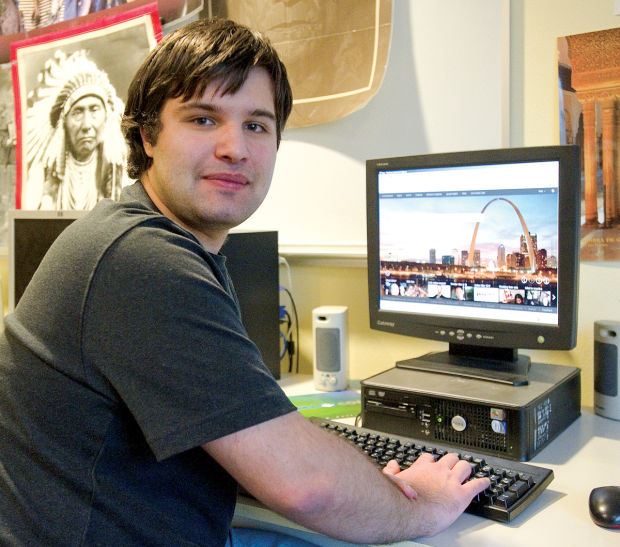TYS got the chance to chat with the Australian entrepreneur and hustler Sam Ali, who founded Commune Sydney to create a healthy, balanced work culture amongst freelancers and start-ups. Ali, freelancer/entrepreneur by day, photographer by night, runs a coworking space for creatives providing networks and resources to foster collaboration within the creative industry. Commune Sydney also offers studio spaces for events like creative workshops, performances, networking and community activities.
We asked him a few questions that will help you learn more about him, the industry, and coworking spaces!
Q. So, first things first, how did the Commune Sydney come into being?
The idea started to form many years ago when I was a junior graphic designer. The original idea was a cool warehouse space when, about 3 years ago, I found myself unable to find a job. I had just come back to Sydney from Melbourne and ended up working in a shared office space. I realised it could be done a lot better, to cater to the creative industry, so I started searching for the right place and pretty quickly I found the Commune.
It was this beautiful warehouse in Newtown. It was only four of us at first, because back then I just wanted to work with friends and have a cool place. There was a photographer, an interior designer, a graphic designer and myself; and back then I didn’t even know the word co-working. There was definitely nothing like that in Newtown or even all of Sydney. It was a slow start but now we’ve been full for close to two years, so I feel very lucky that we’re about to expand.
Q. Wow, you guys have really grown a lot in a short time. How did you get the financial backing when you started?
I’ve always been good at making things happen as part of my job. Sacrifices, of course, always have to be made; I had a vintage car that I sold to help pay for the bond. We were lucky enough to secure some large design jobs that I could inject the cash from into starting off as soon as possible. We started off simple with just eight desks, a printer and an internet connection.
It was slow in the beginning: I didn’t understand how to advertise it. But I found that through community events that we started, we started to get a bit of a following there and some more people would come through the doors, supporting what we do. So the first year was about learning, taking it slow and making mistakes.
Q. What were some of the mistakes you made?
I think being very careful about whom you choose to work with, whom you share your secrets with and whom you trust is important. I made a few mistakes starting out with that. I also felt at first like there were only a few things I could do but I learned I was actually quite capable of running a business. I was scared of doing bookkeeping and doing my own taxes, but now I’ve taught myself and gotten educated in the things I didn’t know.
Q. What do you think are some of the things that keep creatives from becoming entrepreneurs?
Fear is a big factor. That and knowledge. I could’ve done this ten years ago, but I was scared and didn’t have experience, but I had the right idea already. If you have responsibilities, it can be hard; being forced to go freelance is what gave me the freedom to pursue this. If I had to do a studio job, I’d never have thought of doing any of this because I’d be complacent.
Things that feel like the end of the world can actually be a new opportunity.
So I guess it all just happened at the right time for me.
Q. Tell us a bit about your background, and where you grew up.
I’m from Newcastle, where I went to university to study graphic design with a photography component, which are the two things I’m involved with at the moment. I moved to Sydney seven or eight years ago and gravitated towards the Inner West and Newtown. I would spend days walking around taking photos of the street art and the people here. It reminded me of some of the best parts of where I was from but with a sort of vibrancy.
People here are free to express themselves while in Sydney there is otherwise pressure to conform to a certain look. In Melbourne, I noticed a far more eclectic culture and more freedom of expression, so when I went to Newtown, I knew that that was where I wanted to start my business. In another place, it may have been easier to get customers in, but Newtown had the vibe I wanted, and I’d get the chance to educate people about working from a shared space and networking to boot.
Q. Why do you think one should go to a co-working space rather than work from home?
For starters, mental health is far better in an office than when sitting at home in pyjamas, not talking to people for a whole day and going about a mundane routine. It’s not productive either. You’d pay extra for the office but productivity and networking opportunities increase so much that it’s worth it.
You get more work done that way than you ever will sitting at home.
The only people I don’t see successful in a co-working space are ones already struggling to get regular clients who come in hoping for work to pick up, but that extra rent can sometimes affect them so that they struggle to make ends meet. If you’re at a stage where you’ve got regular clients and your business is starting to take off, however, I’d recommend moving out of home, being more professional, preparing to bring clients in and having meetings in this lovely space as the next step as it adds a lot of legitimacy.
I try to gauge where people are placed with their career and recommend, if they’re not ready, that they don’t move or that they just come in for a day or two every week to boost productivity until they can get their business to a level where they can afford to be there full time.
Q. So you have a selection procedure or screening process, then?
Yes, we’re very careful with the people we bring in. It’s like we’re in a shared house where we all have to get along. The dynamics can change very quickly if the wrong person is in the space. I think over time I’ve become a good judge of character and, *knock on wood*, we all get along splendidly. Everyone seems to really enjoy the vibe at our little community.
Q. Would you care to share with us some of the success stories of the people who joined Commune Sydney and had their professional lives change?
One of our first customers, Matt Wood, an interior designer local to Newtown, was working out of his home, making a certain amount every year. He was excellent but would himself testify that once he moved into a co-working space, business just took off, and now he has to turn away clients, and choose the kind of work he wants to do instead of just work to earn a living.
He’s doing very well for himself, has won a few awards and is a really inspiring success story, but I think everyone in their own way has gone to the next step with their business. We’re always at full capacity and people move out for various reasons but I think the largest one is that people get a full-time job at a large company and are happy to leave their freelance days behind for a while.
Q. As a freelancer yourself, what’s the profession like in Australia?
It’s very scary. I think some people find security in a 9-5 job and getting fed work, but I’ve always found that a very anxious process, with your livelihood in someone else’s hands, their decisions and ability to retain clients or obtain new work. I found that now I’m in control of my life–I know when I’ve been working really hard for two months and when I can take two weeks off; when I need to hustle and when I can relax. I’ve been a freelancer for three years now and I love it, I get to choose who I work for and I’m very proud of the work that I do. I have ownership over it now.
Q. Share some marketing tips with us!
Don’t fake it, be as legitimate as possible. You know what you are, what you represent: just put it out there and don’t try to be like anyone else. I don’t know if this is a good or bad thing but I personally don’t look at any other competitor or space like mine- it makes me self conscious and sometimes I want to give up. But I love everything Commune Sydney represents—it represents me, and the people in it, and I’m really passionate about that, looking more internally for inspiration. I love that we have a great deal of followers on our social media, and these aren’t paid ‘likers’ or anything; they’re locals who engage with us and are potential customers. It can be really tough to have followers that actively participate, and the events that we hold increases this strong following.
Q. What kind of events do you organise?
We started a block party last year, as a celebration of everything we love about the Inner West. We got the best local brewery, the best names in food, fashion, and jewellery design. Two years back we had 1500 people show up, and last year we had 8000 people confirm they were attending on our Facebook page. We received an overwhelming response really, much more than we’d anticipated, and police involvement was required.
I’ve realised we have a far broader reach than I thought, but we’re definitely part of the community now, and people know us. We absolutely love the support we’re receiving.
Q. That’s fantastic! How did your crowd-funding with Pozible go?
When it came to building our new space, I realised we could use Pozible to crowd-fund it. I wish I knew this existed when we first started out! I couldn’t think of anything but self-funding back then. The process is a lot of work though, a couple months preparing for the campaign and then the month of the campaign itself is just full-on.
Q. Do you have any tips to share with creative entrepreneurs and artists who’ve been using crowd-funding campaigns?
Most of the work is in the planning, so if you’re in a good place with how to run that 30-day funding–hopefully having scheduled social media posts, rewards, sponsors, everyone supporting you already in place–so that during the campaign you can handle all the little things that pop up.
Having a plan operating smoothly is key in this period.
I’m lucky to have made lot of good friends and get organic shares from our supporters.
You should also get as many people talking abut it as possible. We get a lot of online press, but our main reason to do it, and run all these promotional offers, is to have people ready-to-move-in (at discounted rates) and not open an empty space, like we did in the very beginning.
Q. How many people have you got now?
We’ve got 14 people full time, and about 20 regulars that come in for a day or two each week, so right now we can’t fit any more people. We do the maximum workshops ad gallery sessions we can, and that’s why we’re moving to a new space. I’m taking everything I’ve learned over the past three years and taking it to a new space: we’ll hopefully do everything we haven’t been able to.
Freelancers and entrepreneurs are growing much more celebrated, with crowd-funding and co-working spaces allowing people to achieve their dreams that they’d not thought possible, and I feel good to be a part of that.
Q. That’s a lot of responsibility resting on your shoulders. Doesn’t it get hectic at times?
I can only say that if I didn’t have an iPhone with a calendar, I would be screwed.
I’ve had wild days and have taken on my first employee this year, which I thought would halve my workload but really seems to have increased it. When she goes on holiday, I- [laughs] I nearly die. A lot of my work is meetings and networking, and then I do photography at night and on weekends so my days are free for Commune.
Q. How have you managed to find time and passion for photography, with work getting as hectic as it does?
I have a select amount of time left over and photography helps me continue my freelance and my creative outlet. While Commune satisfies most of my design outlet, photography is still something I’m very passionate about. I started shooting as a kid, and photography was my ‘big thing’ as a teenager: I would print t-shirts in my mum’s garage–home backyard stuff–and sell them at a shop in Newcastle.
Q. You were an entrepreneur from a young age, then?
[laughs] Yeah, my dream back then was to have a skate brand, and then I guess I got lost going through university but eventually I’ve sort of followed that dream. It’s not skateboarding, but it’s cool. I get to control the visuals and do everything that I love for my business now. I think the reason I also keep photography going is because, until Commune Sydney is self-sufficient, I don’t get to draw a big wage from it because I reinvest the money back into the space, and do fun events. I can take on an employee now and pay them and things like that, so until we’re big enough that I can quit my day job, I’m going to keep working, and I love that.
Q. What are the day-to-day struggles of running a co-working space?
Chaging the toilet paper! It’s the simple things really, that make the daily struggle. You can be as big as you want but someone still has to change the toilet paper, and do the dishes, and make sure the place is running. Another issue is the rising prices in rent in Sydney: the rent has doubled in the last three years we’ve been here. I can’t make any more money out of this than I do and I can’t increase rent any more than it already is because there are many other spaces my customers could go to.
Things like this that take me out of my comfort zone force me to find direction creatively and cleverly. That’s the optimistic way I like to see it; at times I go home and cry, but you gotta look at the positive, face your problems.
So this rising rent and property development I fear will push co-working spaces further and further out of the city.
Q. Do you miss Melbourne? Especially at times like this?
Yes; every day. Without that tiny Melbourne, I don’t think I would’ve done what I have.
I feel, in Melbourne, that people were more open to collaborating and working together. It feels like I’ve brought a slice of that back here. The community aspect really impacted me and when I came back to Sydney all I could see was how competitive everyone was, people protecting their clients and network, and not sharing ideas.
Instead of complaining about it, I thought I could bring a little change.
I wanted just to do a little thing, to encourage collaboration and it was a simple thing, Commune: collaborative spaces. I’m not going to take credit for it, but over the last few years, I’ve seen collaboration and creative spaces come up. I’m much happier that I now live in a city that’s also encouraging this and is part of this growth.
Q. In Melbourne, we visited a co-working space some time ago, but it was mostly unoccupied as it was a Saturday. Do you have similar working hours in Sydney, too?
We’re normally busier on weekdays, but it depends on the workload, too, of course. Creativity doesn’t come 9-to-5, so the space is open 24×7 to the regulars. They look after the place themselves when they come in: they lock up and clean up after themselves. We’re all respectful of each other. We’ve also got professional cleaning crew coming in regularly, so we don’t restrict anyone’s creativity to a nine-to-five slot.
Q. Given all the struggles you have to deal with, do you have any suggestions for budding entrepreneurs?
It’s not gonna work for every idea. There’s probably some bad ideas out there, but don’t give up. I had may ideas through my life that I would start – or not even start, I’d get disheartened very quickly. But when I started Commune, I knew, I believed in myself, and I said to myself,
Don’t give up: you’re gonna face hurdles; you’re gonna have competition; you’re gonna have people copying you; you’re gonna have people telling you you can’t, but Don’t. Give. Up.
And that’s why I don’t look at what anyone else is doing. When I see a problem, I think, “It’s not a dead end; it’s a hurdle. I have to get through it somehow,” and with that outlook, you can accomplish a lot. If you don’t give up, it doesn’t have to end, there’ll be times when you think ‘ugh, its over!‘ I just thought it last week [laughs] but you just keep going if it’s a dream, and if it’s important to you. That’s my advice, though it may not relate to everyone.
With coworking spaces catching up in India, we could definitely learn a few things from The Commune and its thriving, creative atmosphere!






















